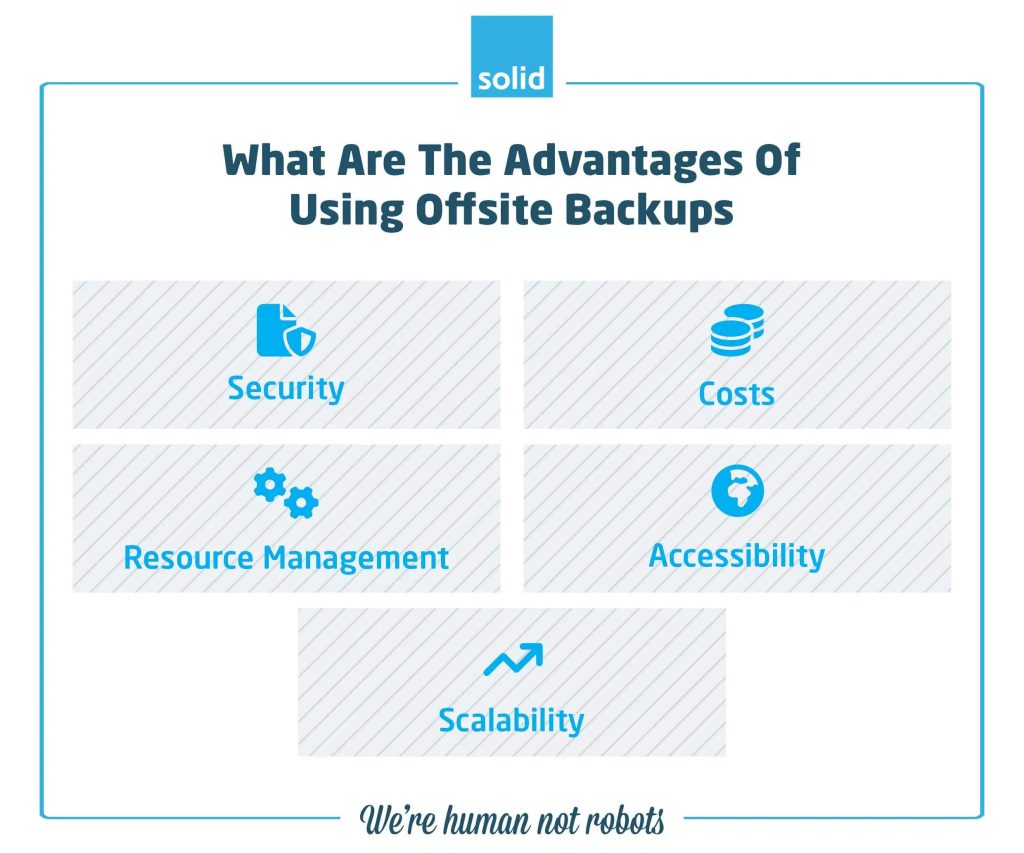
Whether your teams are working every weekday in your offices, are entirely remote, or are spending some days at home and commuting to work on others, you want to make sure that they have access to the information that they need to work effectively. Even more importantly, you want to ensure that your operations never need to grind to a halt because a data disaster sees your information becoming compromised by an attack, deleted through human error, or loses its integrity due to poor maintenance.
This is why businesses around the world are prioritising data backups, and most of them are taking the offsite backup approach.
What Is An Offsite Backup?
An offsite backup is a copy of data, or even a copy of an entire server environment, that is stored away from your offices. This could mean maintaining infrastructure within a data centre environment, or making use of cloud services where a cloud provider like Solid Systems maintains and manages the infrastructure on your behalf.
While offsite backup solutions are not the only option available for keeping copies of your data, they are becoming ever more popular than their on-premises alternatives because of their easy adoption, flexibility, risk mitigation, and the increasing costs involved in provisioning and maintaining an on-premises solution.
How Does Offsite Backup Work?
There are a number of different offsite backup approaches that you can take. We’ve already mentioned, for example, that some businesses choose to control the infrastructure for their offsite storage themselves, renting space within a data centre and provisioning their own hardware. An offsite backup can even involve regularly copying your data onto disks or external hard drives and keeping them in an offsite storage facility. It wouldn’t be a particularly practical way of storing backups, since it would require a lot of manual work and the data itself wouldn’t be easily available if something were to go wrong, but it is a form of offsite backup.
However, the most common method of offsite backup in this modern age is through cloud services. Most companies are going either the public or private cloud storage route, with some even opting to store select information on public networks while maintaining copies of sensitive information on a private cloud server. This is known as hybrid cloud, and can the most cost-effective and secure solution for businesses, as it lets you prioritise security for certain types of data, while prioritising cost for less critical information.
When you’re using cloud solutions for your offsite backup, you can either install software on the devices that need to be backed up, or can access cloud servers through your regular browser. You can then move the data that you want to duplicate across to the cloud manually – selecting the specific files and folders that you want to backup – or you can schedule data to be backed up on a regular basis.
Who Can Benefit From Offsite Backups?
Any company that wants to protect their data can benefit from storing backups off site. In the past, backing up your information and systems was a costly endeavour requiring inordinate amounts of space, outlay costs and maintenance, making it a less feasible solution for small businesses. And large businesses who could afford the costs involved tended to manage their backups on premises. But cloud solutions have levelled the playing field, making off site backups the most affordable and flexible solution for almost all companies.
What Are The Advantages Of Using Offsite Backups?

There are plenty of advantages of offsite backup solutions, not the least of which is the peace of mind it provides in knowing that if disaster strikes in almost any form, your business continuity won’t be devastatingly impacted. Some benefits of offsite backup include:
• Security
There is a common misconception that offsite backup solutions are less secure than their on-premises alternatives, but this couldn’t be further from the truth. Your infrastructure and data security rely on regular maintenance, and cloud solutions are far easier to maintain and control access to, making them a more secure service than most companies would be able to manage from on-premises storage. And because the storage is off site, there is less risk of physical damage due to natural disasters like a fire or power surges that may impact your office environment.
• Costs
With minimal setup costs and storage facilities that can quickly and easily be scaled up or down as and when your needs change, cloud-based offsite backup solutions are affordable for businesses of any size. And as cloud is becoming more popular, the costs involved are also coming down, allowing you to get more for less. IT Services like Microsoft Azure even provide different storage types depending on how often you need to access your data, with Archive Storage, for example, being offered at a lower rate per GB stored.
• Resource Management
When you opt for an offsite backup solution, your cloud provider will often take over the responsibility for managing and maintaining the infrastructure that you use. This will leave your teams with more time and capacity to focus their efforts on furthering your business, without you ever needing to compromise on security.
• Accessibility
An on-premises backup solution is only ever accessible to those within your office environment. Cloud storage, however, makes it significantly easier for the right people to access the data that they need and backup relevant information directly to your offsite backup facilities, no matter where in the world they might find themselves, and no matter what device they may be using.
• Scalability
When you’re working with an on-premises backup solution, every time you run out of hard disc space or processing power, you need to spend money to increase your capacity. Even if the extra space is only needed temporarily – during busy periods for your business, or when you’re switching or migrating data – you still need to invest in infrastructure that will accommodate your highest demand. With offsite backup solutions, you can upgrade or downgrade according to your needs and have access to the new capacity immediately without needing to wait for components to arrive, or needing to spend a fortune acquiring them.
Why Are Off Site Backups Important?
There are so many potential disasters waiting in the wings, and your business needs to be prepared for any scenario. An attack could see your data being held ransom or compromised. An employee could delete critical data either vindictively or unintentionally. Loadshedding could see your hardware failing, or a power surge could lead to data becoming corrupted. You need to ensure that if a disaster does strike you have a plan in place to recover critical information, and an offsite backup of critical data should be part of that Disaster Recovery Plan.
Should You Use Onsite Or Offsite Backups?
No two businesses are the same, and that means that no single solution is going to fit every business model. If you already have an on-premises backup solution in place, and have a team with the knowledge and experience to maintain it, having an offsite backup may not be the right solution for your needs. However even companies with on-premises storage are opting for offsite backup solutions, whether in the cloud or at an easily accessible data centre which they can control. If your business does not have any backup solution in place, then implementing an offsite backup will be the most cost effective and convenient solution for your needs.
How Can Solid Systems Help?
At Solid Systems, we have spent the past 20 years helping to digitally transform businesses, and seeing them embrace cloud computing solutions like Azure storage and offsite backups. We have seen first hand the peace of mind that having a Disaster Recovery Plan which ensures business continuity can offer to companies in South Africa and around the world.
If you’re looking for a cloud storage solution, a technology partner to manage your IT infrastructure and data, or want to consult with cloud and cybersecurity experts to ensure that your business is protected against a wide array of threats and has an effective Disaster Recovery Plan in place, then get in touch with us today and see the different that Solid Systems can make for you.
Frequently Asked Questions
An offsite backup is a copy of data, or even a copy of an entire server environment, that is stored away from your offices. This could mean maintaining infrastructure within a data centre environment, or making use of cloud services where a cloud provider like Solid Systems maintains and manages the infrastructure on your behalf.
There are plenty of benefits to storing a copy of your data offsite. It can improve your data security, reduce costs to your business, allow for better and easier resource management, is more accessible for your teams, and can be quickly and affordably scaled to meet your unique business needs.
Storing a backup of your data is critical in the digital age where cybercrime and threats to your information are on the rise. Where onsite backups mean storing these data backups on your office premises on infrastructure that you source and maintain yourself, offsite backup sees businesses storing copies of their data off premises, most popularly using cloud services which are provisioned and maintained by a cloud provider.





